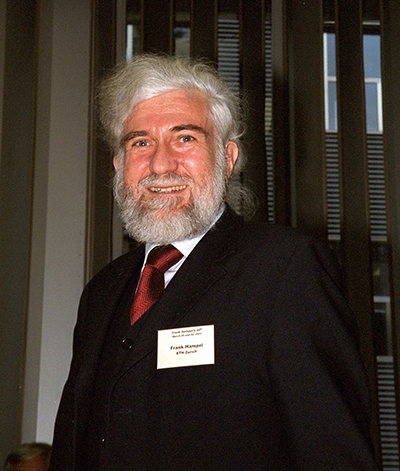Frank Rudolf Hampel, professor emeritus at ETH Zurich, passed away in Thalwil near Zurich, Switzerland, on October 2, at the age of 77.
Frank Hampel was well known for his fundamental contributions to robust statistics, in particular for the introduction of the basic concepts of influence function and breakdown point. The influence function—“perhaps the most useful heuristic tool of robust statistics,” according to Peter Huber (Robust Statistics, Wiley 1981, pp.13–14)—describes the approximate effect on an estimate when inserting, deleting or modifying a single observation. Moreover, the asymptotic variance of an estimator is given by the expected value of the squared influence function. This connection allowed Frank to formulate and solve a central optimality problem in robust statistics, namely to minimize the asymptotic variance under a bound on the influence of a single observation (“Lemma 5” in his thesis). In contrast to the infinitesimal description provided by the influence function, the breakdown point is a global measure that gives the largest percentage of arbitrary bad observations an estimator can tolerate without diverging. His book Robust statistics: The approach based on the influence function, written together with Elvezio Ronchetti, Peter Rousseeuw and Werner Stahel (Wiley, 1986), contains a systematic exposition of the area. It served as a key reference for more than two decades and was highly influential.
In addition to deviations from an assumed marginal distribution, Frank also considered deviations from independence, advocating the use of long-range dependence models as the most relevant type of unsuspected dependence. Another important contribution by Frank is what he called “small sample asymptotics”, a variant of saddle-point approximations for the distribution of estimators, based on a different derivation. They provide an excellent agreement with the exact distribution even for very small samples.
In his later years, Frank focused on the philosophical foundations of statistics. He argued for describing epistemic uncertainty by upper and lower probabilities, corresponding to one-sided bets. In his approach, total ignorance about an event means that one refuses to bet on either the event or its complement. It remains to be seen if these ideas will be recognized in the future as a fundamental new approach.
Frank grew up in Germany during World War II; his father died when he was one year old. His mother then moved to the house of his grandfather in Upper Silesia. Because this region became Polish at the end of the war, the family was forced to leave and ended up near Göttingen. After high school, Frank studied physics, mathematics and philosophy in Munich and Göttingen. His professor in Göttingen, Konrad Jacobs, who worked in ergodic theory, showed him the seminal 1964 Annals of Mathematical Statistics paper by Peter Huber, and encouraged him to go to Berkeley with a one-year exchange scholarship. He decided to stay there and completed his PhD in 1968. Officially, Erich Lehmann was his advisor, but Erich wrote in Reminiscences of a Statistician (Springer, 2008, p.158) that “…in fact I had essentially no input. My ‘contribution’ consisted of my immediate realization of the importance and maturity of this work … and my task was to encourage, smooth the process and otherwise stay out of the way.” After his PhD, Frank accepted an offer by Volker Strassen (famous for proving an invariance principle for the law of the iterated logarithm) to move with him from Berkeley to the University of Zurich and to take a position as “Oberassistent”, being in charge of the statistical consulting service. In 1970–71, Frank was invited together with Peter Bickel and Peter Huber to join John Tukey during the “Princeton robustness year”, which had a big impact on the further development of robust statistics. In 1974, he was elected as associate professor at ETH Zurich, thus becoming a colleague of Peter Huber. He was soon promoted to full professor and stayed at ETH until his retirement in 2006. In 2007 he received an honorary doctorate from the University of Dortmund for his “scientific achievements in the area of modern statistics and data analysis.”
Besides statistics, Frank had a keen interest in, and profound knowledge of, nature, in particular astronomy, birds, orchids and dragonflies. No road was too far and no search too laborious if he could find and observe a species he had never seen before. He was very happy and patient to share his knowledge and enthusiasm with others. Frank was an independent thinker who had a great influence on many statisticians with his original ideas, and at the same time was a very kind person. He is survived by his wife, Verena.
—
Written by Hans R. Künsch, ETH Zurich

1 comment on “Obituary: Frank Hampel, 1941–2018”